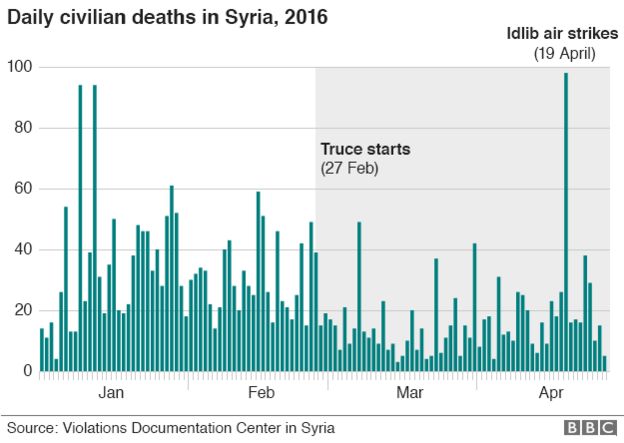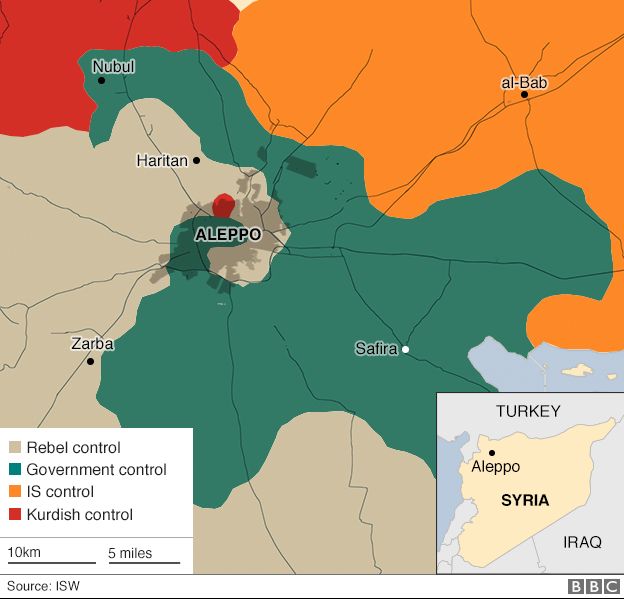The Syrian army says it is observing
a partial and temporary truce with rebels known as a "regime of calm",
apart from in the divided city of Aleppo.
The truce announced by Syrian forces became operational in two areas an hour after midnight local time on Friday.
A statement said it would last for 24 hours in Damascus and the Eastern Ghouta region outside the capital.
Further air attacks have been carried out on parts of Aleppo - a key battleground in the Syrian civil war.
Strikes
hit rebel-held districts for a ninth day, with at least three areas
reported to have been targeted, causing an unknown number of casualties.
The truce is due to last for 72 hours in the northern countryside of Latakia province.
There has been no explanation as to why the halt in fighting is only temporary,
During Friday, rocket barrages fired by rebels were reported to have killed 15 worshippers in a government-held part of Aleppo.
The
Malla Khan mosque in Bab al-Faraj was hit, government officials said,
causing heavy casualties. Some of the injured were in a serious
condition and were likely to die, state television said.
- Aleppo's 'last paediatrician' dead
- Russia's continuing war
- Has opportunity for peace been lost?
- What is left of Syria?
- Assad's growing confidence
In the rebel-held east, government air strikes reportedly left
at least 11 dead and destroyed a medical facility - the second to be hit
in a week.
Crude barrel bombs were also reported to have smashed into
residential neighbourhoods as rescue workers struggled to cope with the
casualties.
The BBC's Jim Muir says that the partial truce is the
result of high-level contacts between the Americans and Russians, who
are being urged by the UN and others to shore up the collapsing
cessation of hostilities which came into effect two months ago.
The
Syrian army says the partial truce is aimed at depriving the rebels of a
pretext for hitting civilian targets and bolstering the existing
ceasefire.
The Americans are hoping the process can be extended
to Aleppo, which the Russians are reported to have refused to include in
the latest truce.
More than 240 people are reported by the
Syrian Observatory for Human Rights to have been killed in the past nine
days of violence there.
'Deliberate' strike
Our
correspondent say this has raised fears of a long and bitter new bout
of hostilities, which would destroy any hope of a return to negotiations
in Geneva.
The Syrian Civil Defence force, whose volunteer
emergency response workers are known as the "white helmets", said that
among the sites targeted by warplanes was a clinic in the Marja area. A
nurse was among several people hurt.
On Wednesday night, the
al-Quds Hospital in the rebel-held Sukkari district was destroyed in air
strikes that US Secretary of State John Kerry said appeared to have
been "deliberate".
Medicins Sans Frontieres (MSF), which supported the hospital, said on Friday that 50 people, including six members of staff, were believed to have been killed.
The aid agency has warned that government forces are preparing for a major offensive against rebel-held areas of the city.
Large
parts of Aleppo have been destroyed and its infrastructure has been
severely damaged, leaving civilians without water and electricity for
months.
In an interview with the BBC, UN Secretary General Ban
Ki-moon called on Syria's leaders to "go beyond their narrow personal
perspectives" and call a halt to the destruction.

The UN High Commissioner for Human Rights, Zeid Raad Al Hussein, said
the failure of the Security Council to refer the situation in Syria to
the International Criminal Court was "an example of the most shameful
form of realpolitik".
Russia and the US are backing opposing sides in the conflict.

No comments:
Post a Comment